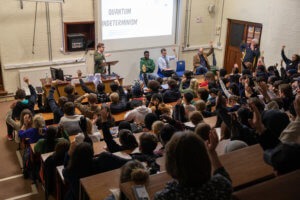-
About CH
Overview
School Life
- Admissions
- Support Us
- Facilities to Hire
- Useful Links
- Contact us
The Kitcher society has met on two occasions this term, for a talk entitled ‘Is There a Problem with Museums?’ by Professor Derek Matravers of the Open University, and for a debate on whether quantum physics proves we don’t have free will, between CH’s own Mr Donoghue, Mr Taylor, and Dr Lacewing.
Professor Matravers’ talk was on a very important and current question: whether museums should repatriate artefacts to their countries of origin. Professor Matravers focused on two case studies; the Benin Bronzes, a group of plaques and sculptures that were taken from Benin city, in modern day Nigeria, in 1897, and the Elgin Marbles, sculptures from the pediment of the Parthenon which were removed from Athens by Lord Elgin in the early 19th century. He began by questioning how we define stealing, and therefore whether these artefacts were actually stolen. In the Benin Bronzes’ case, were they taken as part of a just war, and therefore taken legally? And did Elgin have permission from the Ottoman authorities to take the Elgin Marbles? He then questioned how we define ‘belonging’ (because they do not belong in a legal sense so must in some other sense) and therefore whether these artefacts do indeed ‘belong’ to their countries of origin. Professor Matravers also raised some other issues with repatriation, such as how many objects do not have a clear country of origin, due to the re-drawing of borders in the last few centuries, and whether something can only be culturally significant to a specific place, or whether the artefacts are part of ‘the common heritage of all mankind’. After posing both sides of the argument, Professor Matravers then turned the question of whether museums, in particular the British Museum, should repatriate its artefacts, to the audience, prompting a lengthy series of questions and discussions.
The debate entitled ‘Do the laws of physics mean we don’t have free will?’ was a spectacular affair. The Riches Lecture Theatre was filled to the brim with pupils, many of whom do not study philosophy and are not regular attendees of the Kitcher Society, who had come to see the showdown between Mr Donoghue, Mr Taylor, and Dr Lacewing, chaired by David Asamani. Mr Donoghue began the proceedings with a speech claiming that ‘the very concept of free will is logically incoherent nonsense.’ He put forward an incompatibilist argument based on the claim that quantum physics is deterministic, so nothing can happen except what actually happens. Mr Taylor then made his speech, claiming that we have free will. He argued this by suggesting that our actions are not pre-determined, because there are fundamentally non-deterministic forces and objects, and if any part of a causal chain is non-deterministic then so is the whole thing. Dr Lacewing agreed with Mr Taylor that we have free will but said that this is compatible with the laws of physics, because they enable the neurological processes which allow us to make decisions. He suggested we need to examine how we define free will and proposed the definition ‘free will is the ability to make decisions based on good information about the best choices available to us’. Overall, this debate was a highly intellectual evening, with great arguments on all sides, and it seemed to inspire a new generation of Kitcher Society members.
